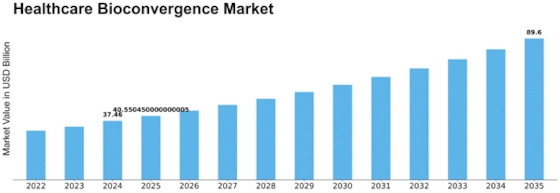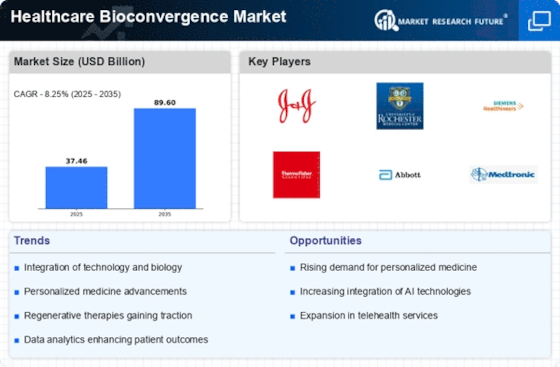Healthcare Bioconvergence Size
Healthcare Bioconvergence Market Growth Projections and Opportunities
The market size of Healthcare Bioconvergence is expected to reach USD 112.4 billion by 2032 at a CAGR of 8.25% during the forecasted period. In a constantly changing landscape, several factors shape the growth and development of the Healthcare Bioconvergence Market. The increasing use of interdisciplinary approaches in healthcare is one of the major drivers for shaping the dynamics of the Healthcare Bioconvergence Market. Traditionally, healthcare has been characterized by distinct and siloed disciplines like medicine, biology, information technology, etc. This barrier is broken by bio convergence to foster collaboration and integration among diverse fields. With this interdisciplinary approach, complex challenges in the health sector can be comprehensively understood, leading to innovative solutions based on insights given by biology, technology, and data science. Technological advancements, particularly AI and big data analytics, have influenced the market dynamics of Healthcare Bioconvergence. Through AI integration with big data, it becomes possible to process and analyze large volumes of biological as well as clinical information, thereby generating insights that can inform medical decisions. Healthcare Bioconvergence Market dynamics are driven by the pursuit of personalized/precision medicine since there is a shift from generalized interventions towards treatment designed specifically for individual patients; bioconvergence then plays a significant role in connecting different datasets such as genomics, proteomics, or clinical data within these settings." Hence, individuals' treatment options are better informed due to understanding patient profiles using finer details provided through this convergence practice, making sure treatments don't waste valuable time. Targeted cures will then be available based on which genomics markers are present, a feature that calls for more personalization, hence underpinning the demand for customized medicine. Ongoing research and development efforts play an important role in determining the dynamics that characterize The HealthCare Bio-convergence Market. Academic institutions, research organizations, and industry stakeholders actively engage in collaborative projects to explore the potential of bio convergence in addressing healthcare challenges." Regulation is an important factor affecting the market dynamics of Healthcare Bioconvergence. Market competition among healthcare technology providers and bioconvergence solution developers is another vital factor influencing market dynamics. To fortify their positions in the markets, companies are using various strategies, including product development, partnership, and acquisition, to offer comprehensive bio-convergent solutions. Due to this competitive environment, different organizations try to set themselves apart through the introduction of innovative technologies, computational models, and integrated platforms.




















Leave a Comment